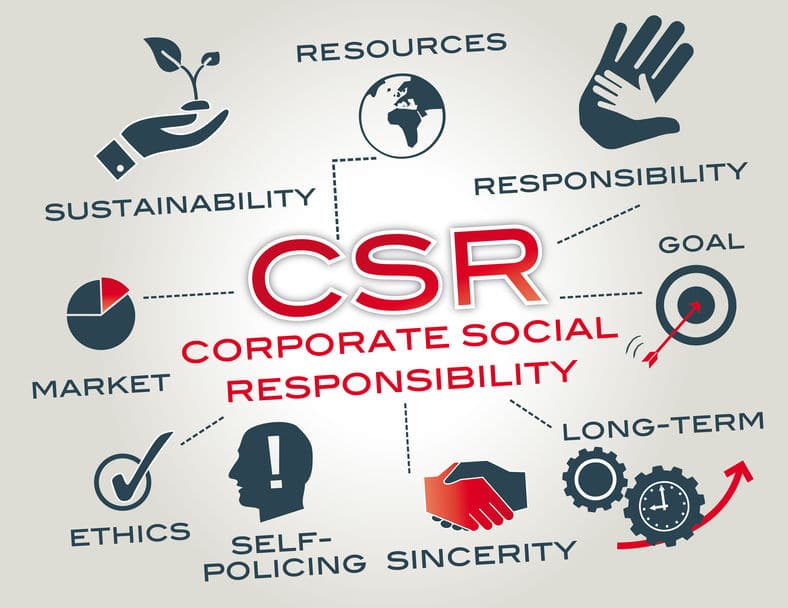Why Social Responsibility Matters for Startups
Social responsibility is no longer a nicety, but a necessity for startups looking to establish a strong reputation, attract and retain top talent, and drive long-term success. By incorporating social responsibility into their business model, startups can demonstrate their commitment to creating positive impact and contributing to the greater good. This, in turn, can lead to enhanced reputation, increased employee engagement, and improved relationships with customers and investors.
According to a recent survey, 75% of millennials are more likely to work for a company that prioritizes social responsibility. Moreover, 85% of consumers say they would switch brands if a company supports a social cause they care about. By embracing social responsibility, startups can tap into this growing demand for purpose-driven businesses and differentiate themselves in a crowded market.
Furthermore, social responsibility can also have a positive impact on a startup’s bottom line. A study by Harvard Business Review found that companies that prioritize social responsibility tend to outperform their peers financially. This is because social responsibility initiatives can help startups build trust with their stakeholders, reduce risks, and identify new business opportunities.
However, social responsibility is not just about philanthropy or corporate giving. It’s about integrating social and environmental considerations into every aspect of a startup’s operations, from supply chain management to product development. By doing so, startups can create a positive impact that resonates with their stakeholders and contributes to the well-being of society.
As the business landscape continues to evolve, startups that prioritize social responsibility will be better positioned to succeed in the long term. By embracing social responsibility, startups can create a positive impact, drive business success, and establish themselves as leaders in their industry.
How to Embed Social Responsibility into Your Startup’s DNA
Embedding social responsibility into a startup’s DNA requires a deliberate and strategic approach. It starts with setting clear values and mission statements that reflect the company’s commitment to social responsibility. This provides a foundation for decision-making and guides the development of social responsibility initiatives.
Establishing a social responsibility team is also crucial for startups. This team can be responsible for developing and implementing social responsibility initiatives, measuring impact, and reporting progress to stakeholders. The team should include representatives from various departments to ensure a holistic approach to social responsibility.
Another key aspect of embedding social responsibility into a startup’s DNA is measuring impact. This involves tracking key performance indicators (KPIs) such as employee engagement, customer satisfaction, and environmental sustainability. Startups can use metrics such as return on investment (ROI) and social return on investment (SROI) to measure the financial and social impact of their social responsibility initiatives.
In addition, startups can integrate social responsibility into their operations by adopting sustainable practices, reducing waste, and promoting diversity and inclusion. This can include initiatives such as energy-efficient lighting, recycling programs, and diversity training for employees.
Technology can also play a critical role in embedding social responsibility into a startup’s DNA. Startups can leverage technology to track and measure their social responsibility initiatives, engage with stakeholders, and promote their social responsibility efforts.
Ultimately, embedding social responsibility into a startup’s DNA requires a long-term commitment to creating positive impact. By setting clear values and mission statements, establishing a social responsibility team, measuring impact, and integrating social responsibility into operations, startups can create a strong foundation for social responsibility and drive long-term success.
By prioritizing social responsibility, startups can also attract and retain top talent, improve relationships with customers and investors, and enhance their reputation. This, in turn, can drive business success and contribute to the well-being of society.
The Role of Leadership in Driving Social Responsibility
Leadership plays a critical role in promoting social responsibility within startups. Leaders who prioritize social responsibility set the tone for the entire organization and inspire employees to follow their lead. By leading by example, leaders can create a culture of social responsibility that permeates every aspect of the business.
One of the key ways leaders can drive social responsibility is by setting clear expectations. This includes establishing clear values and mission statements that reflect the company’s commitment to social responsibility. Leaders should also communicate these expectations to employees and stakeholders, ensuring that everyone understands the importance of social responsibility.
Empowering employees to take action is also crucial for driving social responsibility. Leaders should provide employees with the autonomy to make decisions and take actions that align with the company’s social responsibility goals. This can include providing resources and support for employee-led social responsibility initiatives.
Leaders should also be willing to take calculated risks to drive social responsibility. This may involve investing in new technologies or processes that reduce environmental impact or improve social outcomes. By taking a proactive approach to social responsibility, leaders can create a competitive advantage for their startup and drive long-term success.
Moreover, leaders should be transparent and accountable for their social responsibility efforts. This includes reporting on progress towards social responsibility goals and being open to feedback from stakeholders. By being transparent and accountable, leaders can build trust with stakeholders and demonstrate their commitment to social responsibility.
Ultimately, leadership is critical for driving social responsibility within startups. By leading by example, setting clear expectations, empowering employees, taking calculated risks, and being transparent and accountable, leaders can create a culture of social responsibility that drives long-term success.
As startups continue to grow and evolve, it is essential that leaders prioritize social responsibility and create a culture that values social and environmental impact. By doing so, startups can create a positive impact on society and drive long-term success.
Strategies for Startups to Make a Positive Impact
As a startup, making a positive impact on society and the environment is not only a moral imperative, but also a sound business strategy. By incorporating social responsibility into their business model, startups can enhance their reputation, increase employee engagement, and improve relationships with customers and investors. Here are some practical strategies for startups to make a positive impact:
Volunteering: Encourage employees to volunteer their time and skills to support local charities, community organizations, or environmental initiatives. This can help build team morale, develop new skills, and foster a sense of social responsibility. Startups can also partner with volunteer organizations to amplify their impact.
Philanthropy: Donate a portion of profits or revenues to support social causes or charitable organizations. This can help startups demonstrate their commitment to social responsibility and make a tangible difference in the lives of others. Startups can also establish a donor-advised fund or partner with a philanthropic organization to streamline their giving.
Environmental Sustainability: Implement environmentally friendly practices throughout the organization, such as reducing energy consumption, using renewable energy sources, and minimizing waste. Startups can also develop sustainable products or services that help reduce their customers’ environmental footprint.
Diversity and Inclusion Initiatives: Foster a culture of diversity and inclusion by promoting equal opportunities, providing training and development programs, and celebrating different cultures and perspectives. Startups can also partner with organizations that support underrepresented groups to amplify their impact.
Impact Investing: Invest in initiatives or companies that address social or environmental challenges, such as affordable housing, education, or renewable energy. Startups can also establish an impact investing fund or partner with impact investors to amplify their impact.
Supply Chain Management: Ensure that the startup’s supply chain is socially responsible and environmentally sustainable. This can involve sourcing materials from certified suppliers, reducing waste and emissions, and promoting fair labor practices.
By incorporating these strategies into their business model, startups can make a positive impact on society and the environment while also enhancing their reputation and bottom line. As the concept of startup social responsibility continues to evolve, it’s essential for entrepreneurs to prioritize social responsibility and make it an integral part of their business strategy.
Measuring the Impact of Social Responsibility Initiatives
As startups integrate social responsibility into their business model, it’s essential to measure the impact of these initiatives to ensure they are achieving their intended goals. Measuring impact not only helps startups evaluate the effectiveness of their social responsibility initiatives but also provides a framework for continuous improvement and optimization. Here are some key metrics and frameworks that startups can use to measure the impact of their social responsibility initiatives:
Return on Investment (ROI): While ROI is a traditional metric used to evaluate financial investments, it can also be applied to social responsibility initiatives. Startups can calculate the ROI of their social responsibility initiatives by comparing the costs of implementing these initiatives to the benefits they generate, such as increased brand reputation, employee engagement, and customer loyalty.
Social Return on Investment (SROI): SROI is a more comprehensive metric that takes into account the social and environmental benefits of an investment. Startups can use SROI to evaluate the impact of their social responsibility initiatives on stakeholders, including employees, customers, and the environment.
Environmental Impact Assessments: Startups can conduct environmental impact assessments to evaluate the environmental benefits of their social responsibility initiatives, such as reducing energy consumption, waste, and emissions. This can help startups identify areas for improvement and optimize their environmental sustainability initiatives.
Stakeholder Engagement Metrics: Startups can use metrics such as stakeholder engagement surveys, feedback forms, and social media analytics to evaluate the impact of their social responsibility initiatives on stakeholders, including employees, customers, and investors.
Key Performance Indicators (KPIs): Startups can establish KPIs to measure the progress of their social responsibility initiatives, such as the number of employees participating in volunteer programs, the amount of donations made to charitable organizations, or the reduction in energy consumption.
By using these metrics and frameworks, startups can effectively measure the impact of their social responsibility initiatives and make data-driven decisions to optimize their social responsibility strategies. This not only helps startups achieve their social responsibility goals but also enhances their reputation, increases employee engagement, and improves relationships with customers and investors.
Incorporating social responsibility into a startup’s business model requires a commitment to measuring and evaluating impact. By doing so, startups can ensure that their social responsibility initiatives are effective, efficient, and aligned with their overall business strategy. As the concept of startup social responsibility continues to evolve, it’s essential for entrepreneurs to prioritize impact measurement and evaluation to drive long-term success and sustainability.
Overcoming Common Challenges to Social Responsibility
While integrating social responsibility into a startup’s business model can have numerous benefits, it’s not without its challenges. Startups may face obstacles such as limited resources, competing priorities, and stakeholder skepticism, which can hinder their ability to implement effective social responsibility initiatives. Here are some common challenges that startups may face and strategies for overcoming them:
Limited Resources: Startups often have limited financial and human resources, which can make it difficult to implement social responsibility initiatives. To overcome this challenge, startups can start small by implementing low-cost or no-cost initiatives, such as volunteering or reducing energy consumption. They can also partner with other organizations or stakeholders to share resources and expertise.
Competing Priorities: Startups often have competing priorities, such as growing revenue and expanding their customer base. To overcome this challenge, startups can integrate social responsibility into their core business strategy, making it a key priority. They can also establish clear goals and metrics for social responsibility initiatives, ensuring that they are aligned with the company’s overall mission and objectives.
Stakeholder Skepticism: Startups may face skepticism from stakeholders, including employees, customers, and investors, who may question the value of social responsibility initiatives. To overcome this challenge, startups can communicate the benefits of social responsibility initiatives clearly and transparently, highlighting the positive impact on the business and society. They can also engage stakeholders in the development and implementation of social responsibility initiatives, ensuring that their concerns and ideas are heard.
Lack of Expertise: Startups may not have the expertise or knowledge to implement effective social responsibility initiatives. To overcome this challenge, startups can partner with organizations or consultants who have expertise in social responsibility, such as non-profits or sustainability consultants. They can also provide training and development programs for employees to build their skills and knowledge in social responsibility.
Measuring Impact: Startups may struggle to measure the impact of their social responsibility initiatives, which can make it difficult to evaluate their effectiveness. To overcome this challenge, startups can establish clear metrics and goals for social responsibility initiatives, ensuring that they are aligned with the company’s overall mission and objectives. They can also use data and analytics to track progress and make adjustments as needed.
By understanding and addressing these common challenges, startups can overcome obstacles and implement effective social responsibility initiatives that drive long-term success and sustainability. By prioritizing startup social responsibility, entrepreneurs can create a positive impact on society and the environment while also enhancing their reputation, increasing employee engagement, and improving relationships with customers and investors.
Real-World Examples of Socially Responsible Startups
While integrating social responsibility into a startup’s business model can seem daunting, there are many real-world examples of companies that have successfully done so. Here are a few examples of startups that have prioritized social responsibility and achieved significant success:
Patagonia: Patagonia is a well-known outdoor apparel brand that has been a leader in environmental sustainability for decades. The company has implemented a number of socially responsible initiatives, including using environmentally-friendly materials, reducing waste, and promoting fair labor practices. Patagonia’s commitment to social responsibility has helped the company build a loyal customer base and establish a strong brand reputation.
Warby Parker: Warby Parker is a fashion startup that has disrupted the traditional eyewear industry with its affordable, stylish glasses. The company has also prioritized social responsibility, partnering with non-profits to provide eye care to underserved communities and implementing sustainable practices in its supply chain. Warby Parker’s commitment to social responsibility has helped the company build a strong brand reputation and attract socially conscious customers.
TOMS: TOMS is a footwear startup that has built a business model around social responsibility. For every pair of shoes sold, TOMS donates a pair to a child in need. The company has also expanded its social responsibility initiatives to include providing clean water and supporting education programs. TOMS’ commitment to social responsibility has helped the company build a loyal customer base and establish a strong brand reputation.
REI: REI is a consumer co-op that has been a leader in outdoor retail for decades. The company has prioritized social responsibility, implementing sustainable practices in its supply chain and promoting environmental conservation. REI has also partnered with non-profits to promote outdoor education and conservation. The company’s commitment to social responsibility has helped it build a loyal customer base and establish a strong brand reputation.
These examples demonstrate that prioritizing social responsibility is not only the right thing to do, but it can also drive business success. By integrating social responsibility into their business models, startups can build strong brand reputations, attract socially conscious customers, and drive long-term success. As the concept of startup social responsibility continues to evolve, it’s essential for entrepreneurs to prioritize social responsibility and make it a core part of their business strategy.
Conclusion: Why Social Responsibility is a Key Driver of Startup Success
In conclusion, social responsibility is a critical component of startup success. By integrating social responsibility into their business model, startups can enhance their reputation, increase employee engagement, and improve relationships with customers and investors. Moreover, social responsibility can drive long-term success and sustainability, as it helps startups build trust, credibility, and loyalty with their stakeholders.
As we have seen throughout this article, there are many ways that startups can prioritize social responsibility, from volunteering and philanthropy to environmental sustainability and diversity and inclusion initiatives. By taking a proactive approach to social responsibility, startups can make a positive impact on society and the environment while also driving business success.
It’s essential for entrepreneurs to prioritize social responsibility and make it a core part of their business strategy. By doing so, they can create a positive impact on society and the environment, drive long-term success and sustainability, and establish a strong brand reputation. As the concept of startup social responsibility continues to evolve, it’s crucial for entrepreneurs to stay ahead of the curve and prioritize social responsibility in their own businesses.
In today’s business landscape, social responsibility is no longer a nicety, but a necessity. Startups that prioritize social responsibility are more likely to succeed in the long term, as they build trust, credibility, and loyalty with their stakeholders. By making social responsibility a core part of their business strategy, startups can drive business success while also making a positive impact on society and the environment.
Ultimately, the key to startup success lies in prioritizing social responsibility and making it a core part of the business model. By doing so, entrepreneurs can create a positive impact on society and the environment, drive long-term success and sustainability, and establish a strong brand reputation. As the business landscape continues to evolve, it’s essential for entrepreneurs to prioritize social responsibility and make it a core part of their business strategy.







